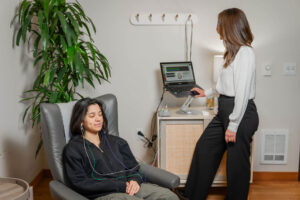“My mind just isn’t what it used to be.”
We’ve all heard those words before from a grandparent or another senior in our lives. Mental decline is a common side effect of aging, and is one of the biggest fears people have about getting older.
It doesn’t have to be. There are plenty of things you can start doing today that will help you keep your mind sharp and let you age with grace.
By following these tips and tricks, you can maintain mental cognition regardless of your age:
Never Stop Learning
Learning new things can improve your mental stimulation. The learning process helps build up your brain by curating new connections between nerve cells. In some cases, you may even generate new brain cells and build up a reserve, potentially preventing the future loss of cells.
The Harvard Business Review states that continuous learning is good for your health. One of their neurological studies notes that cognitive activity doesn’t change the biology of Alzheimer’s Disease, but learning new things can help delay its symptoms.
Here are a few examples of mentally stimulating activities:
- Learn a new language
- Memorize Shakespeare, scripture, or poetry
- Pick up a musical instrument
- Take courses at your local community college
The trick to keeping your mind sharp is to learn something that doesn’t come easy to you. If you’re naturally gifted in fine arts, try learning chemistry or physics. If you’re not a technological savant, try learning how to code. These activities will strain your brain, making it work harder to deliver results.
Exercise Regularly
Exercise improves neuroplasticity, which is your brain’s ability to grow new neural and blood pathways, much like your brain does when you learn something new. These pathways are formed because you’re stimulating your mind. The more you have, the better it can respond to neurodegenerative diseases, head trauma, and more.
As with learning, you have to strain your body to achieve results. Most adults should partake in 150 minutes of moderately intense physical activities every week.
Moderately intense exercise gives you an endorphin rush. Endorphins are chemicals your body naturally reduces to cope with stress, pain, and depression. They are released by your hypothalamus and your pituitary gland, and mimic what it feels like to be on morphine. In fact, endorphins got their name from the term “endogenous morphine.”
Exercise also promotes healthy bacteria growth in your gut. Your gut contains trillions of bacteria, known as the microbiome. There’s a symbiotic relationship between gut and brain health.
Exercise alters the composition and functional capacity of your gut microbiota, and spurns the balance and diversity of the specific bacteria your gut needs to remain healthy. When your gut lacks this diversity, you may find yourself in psychological distress.
Exercise also helps you sleep better, lose weight, and improves your cardiovascular health.
Play Video Games
Computer-based exercises can improve your memory and problem solving skills. They can also help you process information, bolster your reasoning, and improve your ability to pay attention.
In a 2015 joint study, researchers found associations between playing action-packed video games and an increased volume of gray matter in your brain. Gray matter helps improve your memory, emotions, and your ability to control your movements. The study also found that video games can strengthen your brain’s ability to communicate with itself by improving hand-eye coordination, memory, decision making, and problem-solving.
However, not all video games are created equal. Different games offer varying cognitive challenges and skills. For best results, play games that are strategy-based, require multitasking, and force you to adapt, learn, and change your tactics based on your environment.
As of this post, the WHO hasn’t suggested any specific screen time limits for older children, but some research has suggested that excessive screen time for teenagers could be linked to mental health problems like anxiety and depression. I’d recommend limiting screen time to one hour per day.
Stay Social
Maintaining social connections may help protect against the downsides of aging. Socializing stimulates attention and memory, which helps strengthen your neural networks.
However, not all relationships are created equal. The quality of a social engagement matters. Positive interactions make you feel good and can reduce stress, anxiety, and depression. Negative engagements have the opposite effect, and can make you feel depleted.
One study of SuperAgers (people who are 80 years of age or older) reveals that people who maintain strong, trusting, positive friendships have cognitive ability that’s at least as good as people twenty or thirty years their junior.
Another study reveals that these SuperAgers’ cerebral cortex is larger than that of their peers. Your cerebral cortex helps high-level processes, including thought, reasoning, and memory. When you lose cortex volume, your risk of memory loss, Alzheimer’s, and dementia increases.
Also, when looking at brain autopsies, one study revealed that people who weren’t experiencing feelings of loneliness showed the same physiological evidence of neurodegenerative diseases. However, they never developed the symptoms.
Manage Your Heart Health
Cognitive decline is directly linked with poor cardiovascular health, including:
- Smoking
- High blood pressure
- High cholesterol
- Obesity
- Poor diet
- Type 2 diabetes
Your heart is responsible for pumping blood through vessels throughout your body, including your brain. When damaged, these vessels can’t function optimally.
Strokes are one common end-result of poor blood circulation. A stroke is a “brain attack” that occurs when a plaque or clot blocks a blood vessel in your brain, or when a blood vessel bursts in the brain.
When you have a stroke, some of your brain tissue dies, which can lead to memory loss. About 795,000 people in the United States have a stroke each year. It’s also a leading cause of death and a common cause of serious disabilities for adults.
Vascular dementia is often the result of the combined impact of multiple strokes, including silent strokes, which don’t initially cause noticeable symptoms. Keeping your blood pressure in check reduces your chances of a vascular dementia diagnosis.
Keep Your Mind Sharp By Repeating Information
Remember when you took notes in school? Apply that same skill in your everyday life. If you want to recall something you’ve just heard or read about, say it out loud or write it down. Doing this helps reinforce your memory, better connecting you to the information.
You can also play a word association game in your head. For example, if your cousin’s roommate, Fiona, works as a flight attendant, you can internally refer to her as “Fiona the flight attendant.”
Repetitive learning and associative recognition puts your hippocampus to work. Your hippocampus stores long-term memories, making them harder to forget. One study suggests that associative memory activates “two distinct hippocampus-related brain networks.” It also increases connectivity between your hippocampus and posterior regions, improving associative memory retrieval.
Give Neurofeedback a Try
Keep your mind sharp by training it to function optimally.
Neurofeedback can improve your focus, memory, reduce stress, and much more. It shows your brain its own dysfunctional patterns and helps it naturally learn, adapt, and grow into something better.
If you’d like to learn more, schedule a session and join the 85% of people who have significantly benefited from neurofeedback treatments.
In health,
Dr. Jessica Wendling
Sources:
- https://hbr.org/2017/02/lifelong-learning-is-good-for-your-health-your-wallet-and-your-social-life
- https://n.neurology.org/content/85/1/48
- https://lisafeldmanbarrett.com/about/
- https://www.sciencedirect.com/science/article/abs/pii/S0306452206003228
- https://www.ncbi.nlm.nih.gov/pmc/articles/PMC6296269/
- https://www.cdc.gov/nccdphp/dnpao/features/physical-activity-brain-health/index.html
- https://pubmed.ncbi.nlm.nih.gov/2205777/
- https://pubmed.ncbi.nlm.nih.gov/21076975/
- https://pubmed.ncbi.nlm.nih.gov/30883471/
- https://www.ncbi.nlm.nih.gov/pmc/articles/PMC6748614/
- https://pubmed.ncbi.nlm.nih.gov/30704343/
- https://www.nia.nih.gov/news/video-games-show-potential-improving-key-aspects-memory-older-adults
- https://www.nature.com/articles/srep09763
- https://www.ncbi.nlm.nih.gov/books/NBK553239/
- https://pubmed.ncbi.nlm.nih.gov/20436205/
- https://www.health.harvard.edu/blog/3-ways-to-build-brain-boosting-social-connections-202109082585
- https://www.health.harvard.edu/mind-and-mood/fostering-healthy-relationships
- https://news.northwestern.edu/stories/2017/november/close-friends-superager-memory/
- https://jamanetwork.com/journals/jama/fullarticle/2614177
- https://jamanetwork.com/journals/jamapsychiatry/fullarticle/482179
- https://www.cdc.gov/heartdisease/brain_health.htm
- https://www.cdc.gov/stroke/
- https://www.mindyourrisks.nih.gov/
- https://www.health.harvard.edu/heart-health/what-is-a-silent-stroke
- https://www.ncbi.nlm.nih.gov/pmc/articles/PMC6050388/
How long is a neurofeedback treatment session?
Each treatment session is scheduled for 30 minutes. But the neurofeedback treatment itself only takes a few seconds to a few minutes. It’s short and simple, and requires no focused attention, making it an ideal treatment for people with attention issues or those on the autism spectrum.
Are there any side effects?
Yes, it is possible to experience temporary states of feeling “wired” or “tired” lasting around 24-48 hours after LENS (Low Energy Neurofeedback System) treatment. The “wired” state may involve hyperstimulation, increased energy, difficulty sleeping, and potential exacerbation of anxiety or irritability. Conversely, the “tired” state can manifest as lethargy, increased sleep, or an exacerbation of feelings of depression. Mild headaches or dizziness may occur infrequently. It’s important to understand that these effects are temporary and will resolve on their own, typically within the specified timeframe. While these temporary states may be uncomfortable, they are indicative of a positive response to the therapy combined with overstimulation. Your provider can offer personalized guidance, monitor your progress, and will adjust the treatment to a gentler level to ensure you receive all the benefits without experiencing side effects.
Will neurofeedback work for me?
Over 85% of people benefit significantly from it. This treatment is particularly beneficial for severe cases, where one might feel “stuck” in their negative behavioral or pain patterns. As we reinforce new and healthy brainwave patterns each week, they grow stronger – like exercising a muscle.




